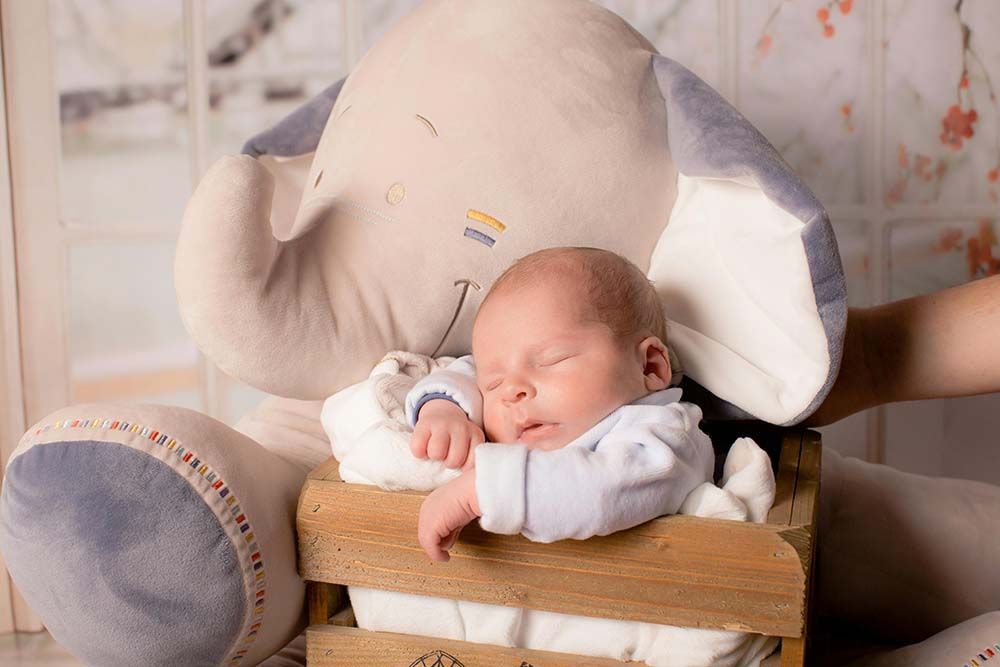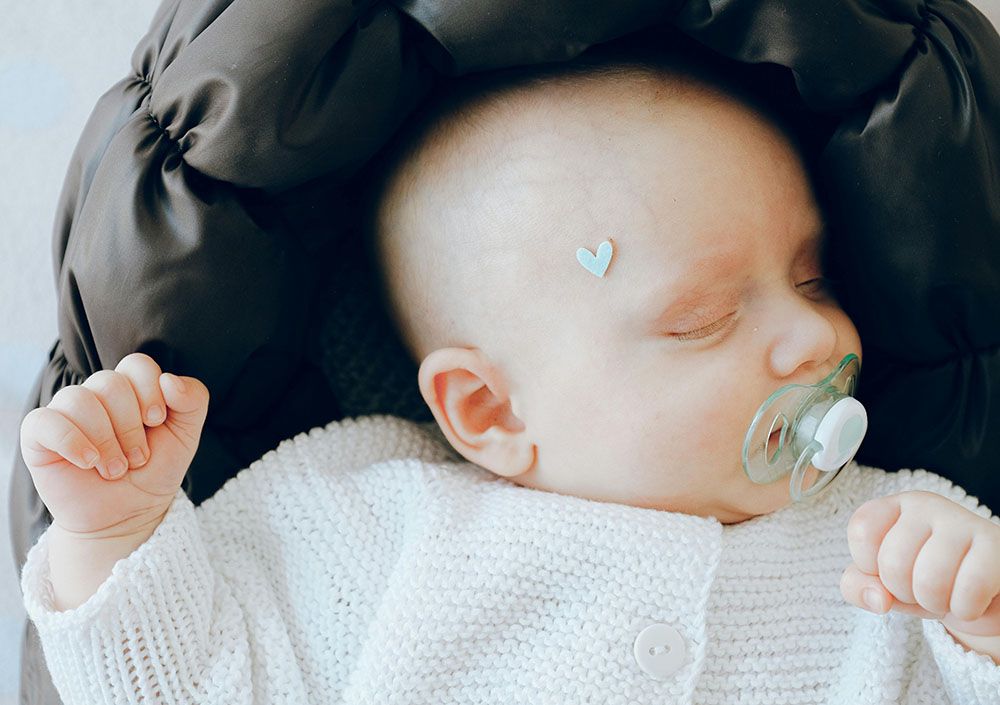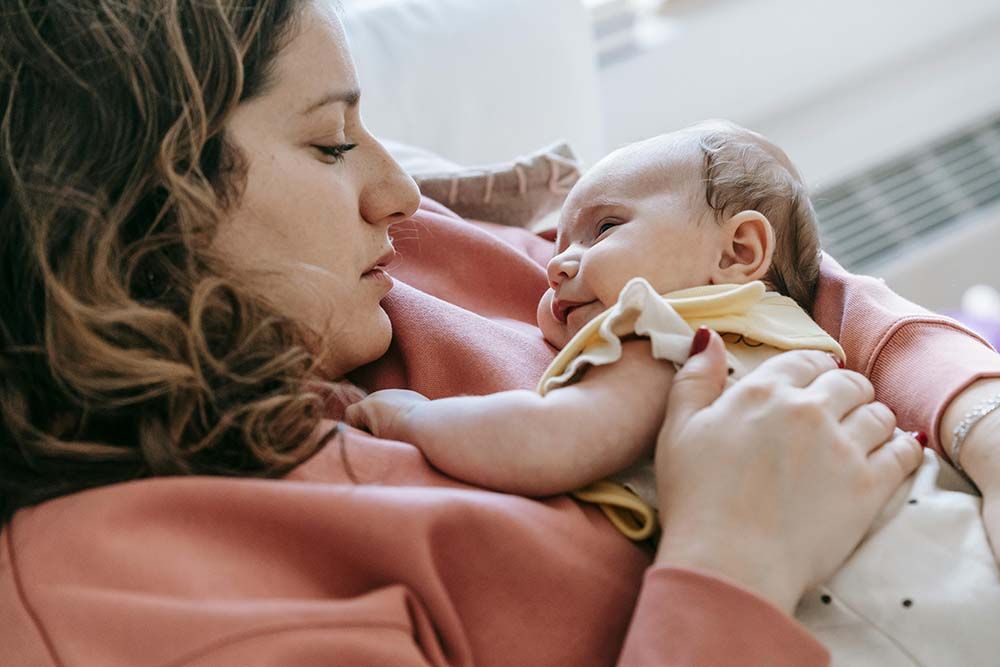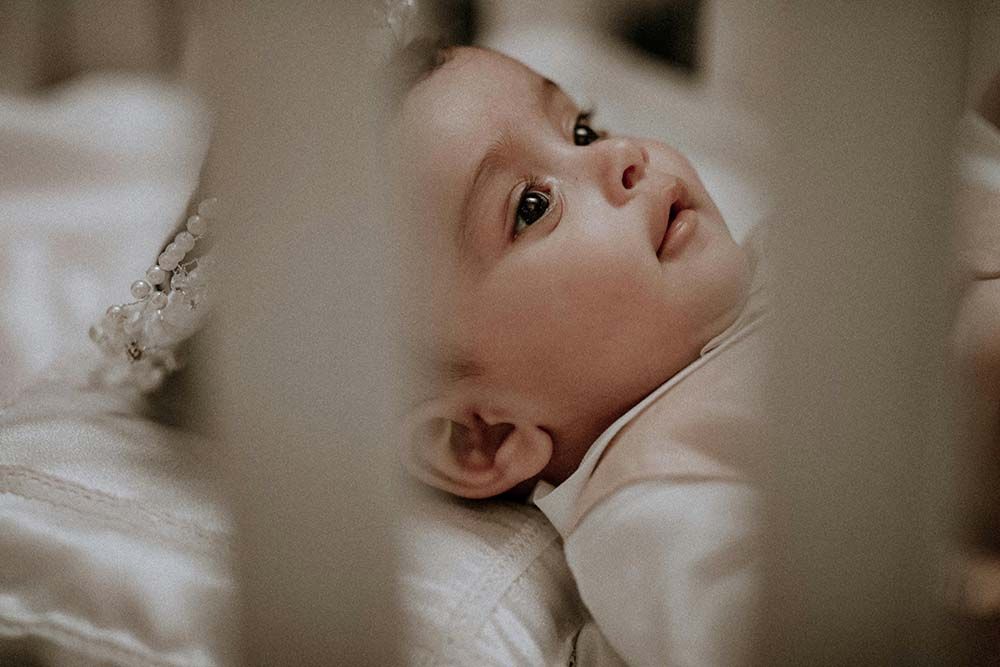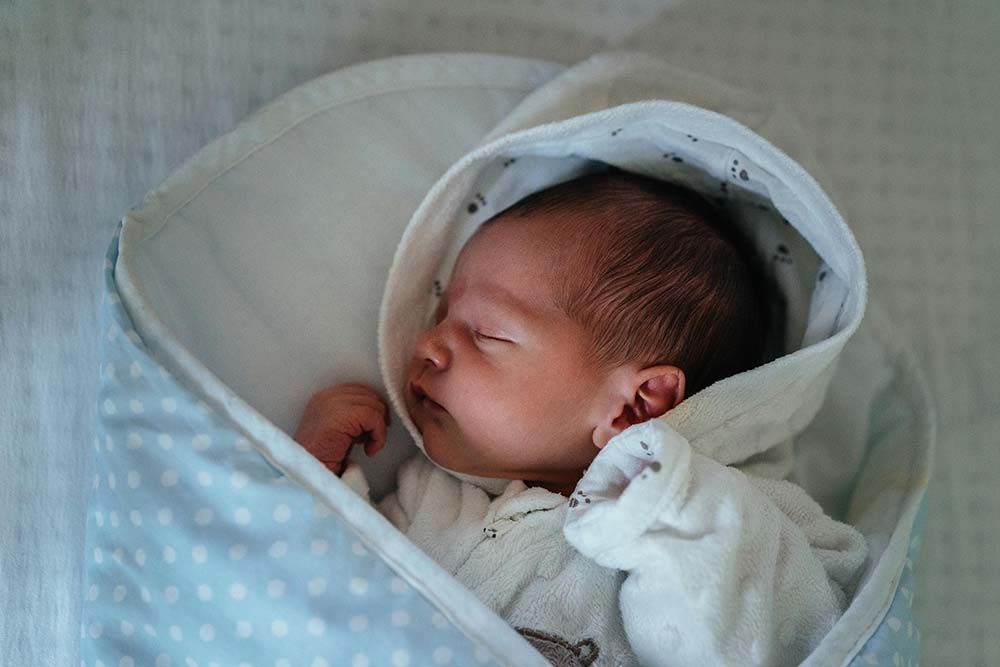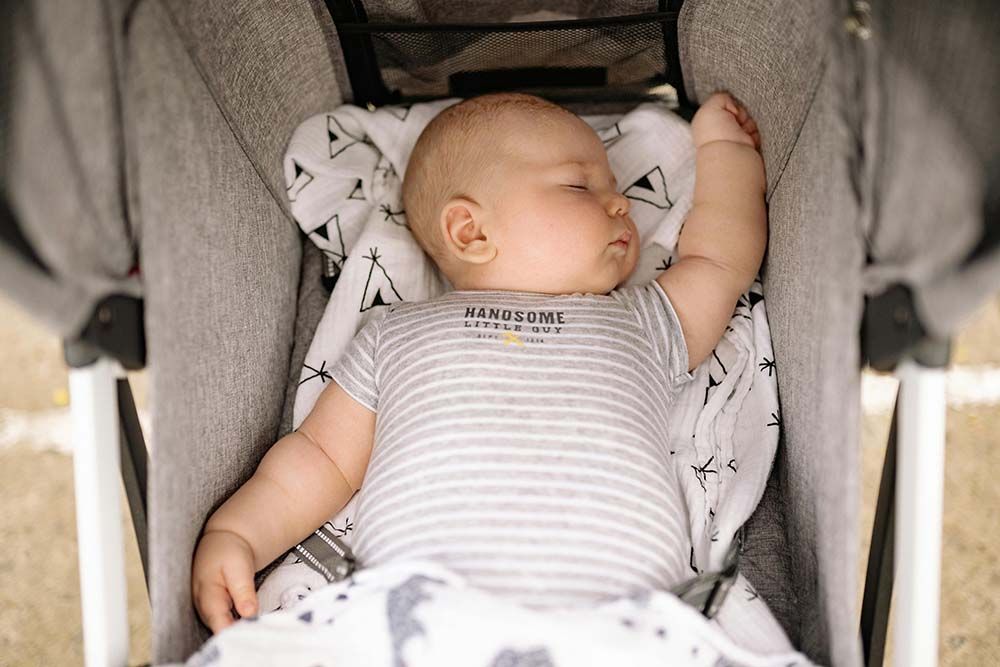

By the time your child reaches 13 months, their sleep patterns may seem more predictable compared to the newborn stage, but new challenges can arise as they continue to develop. In this article, we'll explore the key aspects of a 13-month-old's sleep schedule, offering detailed insights and practical advice to help you and your baby achieve restful nights and productive days.
Understanding and managing your 13-month-old's sleep schedule is essential for their health and well-being. However, due to the uniqueness of every baby, it may take some trial and error to find what works best for your family. Instead, work with Moonycare app. It can simply help you build consistent routines, address sleep issues, foster scientific sleep habits that can benefit your baby and you for years to come.
IN THIS ARTICLE:
What are Wake Windows for a 13 Month Old?
A Sample Sleep Schedule for 13 Month Old Babies
How Much Should a 13 Month Old Sleep?
How Long Should a 13 Month Old Nap?
How Many Naps are Suitable for a 13 Month Old?
Is 13 Months Too Early for One Nap?
Why is my 13-Month-Old Refusing Naps?
What Time Should a 13-Month-Old Go to Bed?
Can a 13-Month-Old Baby Sleep Through the Night?
Can you Sleep Train a 13-Month-Old?
Is there Sleep Regression for 13 Month Old Babies?
What are Wake Windows for a 13-Month-Old?
For a 13-month-old, it is recommended to set wake windows at 3 to 4 hours. Proper management of wake windows can help your baby prevent from becoming overtired and being unable to fall asleep at the next nap or bedtime.
Morning Wake Window: The first wake window after waking up in the morning is usually around 3 hours. This helps the baby adjust from nighttime sleep and prepare for the morning nap.
Afternoon Wake Window: The second wake window tends to be slightly longer, about 3 to5 hours, as the baby has more energy after the morning nap.
Evening Wake Window:The final wake window before bedtime can extend up to 4 hours. This ensures the baby is sufficiently tired for a full night's sleep.
Sample 13-Month-Old Sleep Schedule
Creating a structured sleep schedule is vital for maintaining healthy sleep habits. Here is a sample sleep schedule for a 13-month-old:
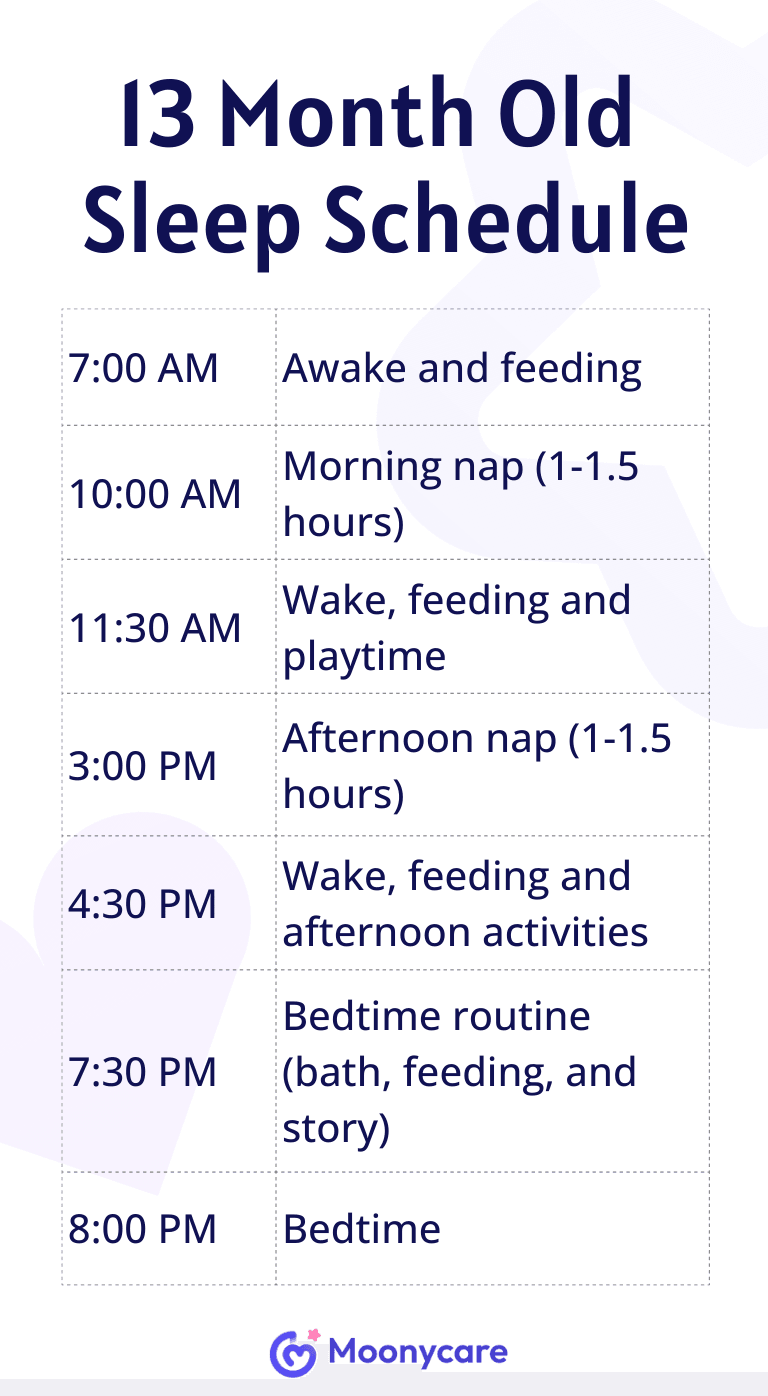
This schedule balances wake and sleep times, promoting consistent and restorative sleep. Note that you don't have to obey a completely same one for your baby as each baby is different.
How Much Should a 13-Month-Old Sleep?
On average, a 13-month-old needs about 12 to 14 hours of sleep in a 24-hour period. This typically includes 10 to 12 hours of nighttime sleep and some daytime naps. It is normal for some babies that sleep less than this range, but ensuring your baby gets enough sleep that is crucial for their cognitive and physical development.
How Long Should a 13-Month-Old Nap?
Napping is essential for a 13-month-old's growth and mood. At this age, babies usually take a morning nap and an afternoon nap respectively per day, with each nap lasting about 1 to 1.5 hours. The total nap time should be around 2 to 3 hours daily. But note that the afternoon nap shouldn't last closely to the bedtime. Otherwise, baby won't feel drowsy when the bedtime routine is approaching.
How Many Naps are Expected for a 13-Month-Old?
Most 13-month-olds still need two naps per day. Transitioning from two naps to one typically occurs between 15 and 18 months, but some babies may start this transition a bit earlier or later. Pay attention to your baby's sleep cues and adjust their schedule as needed.
Is 13 Months too Early for One Nap?
Most babies still benefit from two naps at this age. While some babies might be ready for the transition to one nap around 13 months, it is generally considered a bit early. If you have observed the behaviors that your baby is prepared for one nap, you can consider to allow your baby take 1 nap a day. The behaviors might conclude refusing the second nap consistently, being able to stay awake longer without becoming overly tired, and maintaining a good mood throughout the day with only one nap.
Why is my 13-Month-Old Refusing Naps?
Nap refusal can be frustrating, but it is often temporary and part of normal development. Reasons for it include:
-
Developmental Milestones: Learning new skills can disrupt sleep.
-
Overtiredness: Missing the ideal nap window can make it harder to fall asleep.
-
Separation Anxiety: Your baby may resist napping due to separation from you.
To address nap refusal, ensure a consistent nap routine, create a calm pre-nap environment, and adjust wake windows if needed.
What Time Should a 13-Month-Old Go to Bed?
Ideally, a 13-month-old should go to bed between 7:00 and 8:00 PM. This bedtime allows for sufficient nighttime sleep and aligns with natural circadian rhythms. If your baby consistently wakes up too early or has trouble falling asleep, consider adjusting their bedtime slightly earlier or later.
Can a 13-Month-Old Baby Sleep Through the Night?
Yes, many babies at this age can sleep through the night. However, some may still wake up occasionally for various reasons, such as:
-
Hunger: Growth spurts may cause increased hunger.
-
Developmental Milestones: such as teething. Discomfort from emerging teeth can disrupt sleep.
-
Separation Anxiety: Increased awareness of being apart from parents can cause waking.
-
Overtiredness: Missing the ideal bedtime or nap times can lead to night wakings.
To solve it, ensure your baby is well-fed before bed and maintain a consistent sleep routine.
Is it Suitable for Sleep Training a 13-Month-Old?
Yes. Although 13 months may exceed the suggested age range that pediatricians provide, it is never too late to start to foster a healthy sleep habits. Sleep training can not only help your baby learn to fall asleep independently and stay asleep longer, but also free you to have a stable sleep that you've need looking for. If needed, you can try the following methods:
-
Cry It Out (CIO): Allowing your baby to cry for a set period before offering comfort.
-
Ferber Method: Gradually increasing the time you let your baby cry before soothing them.
-
Gentle Sleep Training: Gradually reducing your presence in the room as your baby falls asleep.
Choose a method that fits your family's comfort level and be consistent with the approach.
Sleep Regression of a 13-Month-Old
Sleep regression is common around this age due to developmental changes, such as increased mobility and cognitive skills. Your babies have the behaviors below meaning that they are experiencing this period. For example:
-
Increased Night Wakings: More frequent waking during the night.
-
Difficulty Falling Asleep: Longer time needed to fall asleep at bedtime or naps.
-
Shorter Naps: Naps becoming shorter and less restorative.
Normally, sleep regression won't last too long. To manage it, maintain a consistent sleep schedule, provide comfort as needed, and be patient as your baby adjusts. Be careful don't make any adjustments, which may lead a short difficulty to an endless dilemma.
13-Month-Old Sleep Tips
Here are some tips to promote healthy sleep habits for your 13-month-old:
-
Consistent Routine: Establish a predictable bedtime and nap routine to signal sleep time.
-
Sleep Environment: Create a dark, quiet, and cool sleep environment. Ensure it is comfortable for babies to sleep.
-
Limit Stimulants: Avoid stimulating activities and screen time before bed.
-
Comfort Items: Introduce a lovey or blanket for comfort.
-
Positive Sleep Associations: Encourage self-soothing techniques, such as a pacifier or thumb-sucking.







